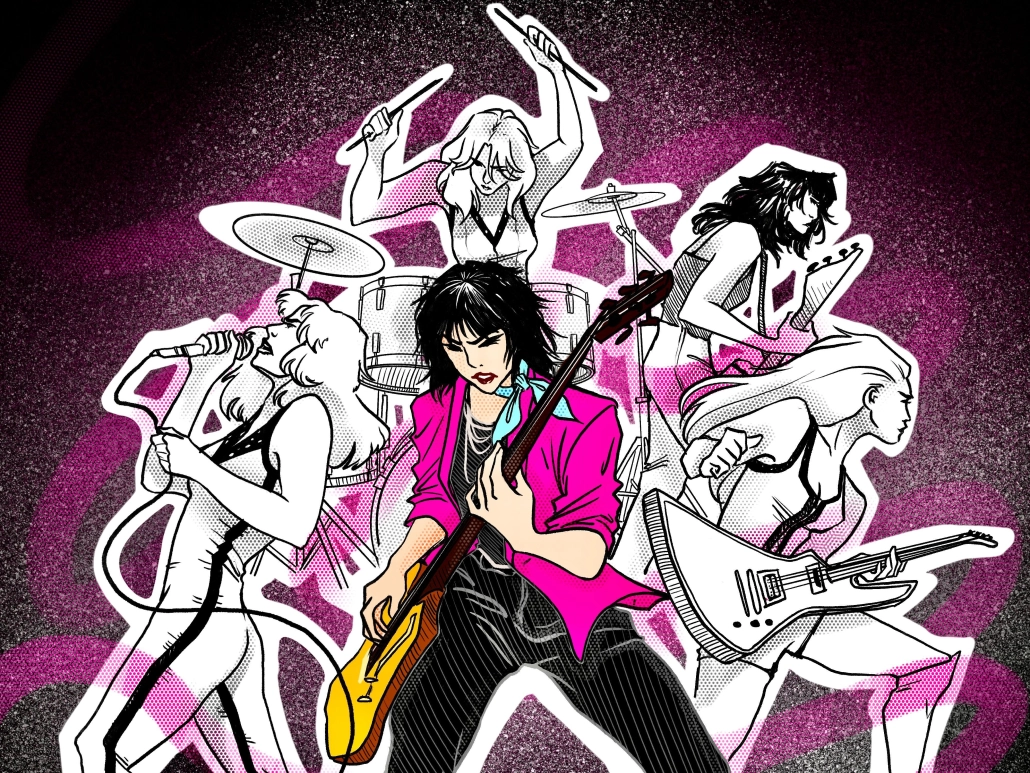SHREDDING THE MASTERS
Joan Jett is the Queen of Rock
“I Love Rock N’ Roll,” and you should, too.
“I Love Rock N’ Roll,” and you should, too.


Defining a genre isn’t easy, especially when it comes to rock ’n’ roll. The genre’s sound varies wildly, even when looking at a single decade of rock. That said, there is one figure that defines rock better than any convoluted explanation can: Joan Jett.
Jett is rock personified, both in her story and her music. And though she may not be a household name in the same vein as Prince or Michael Jackson, everyone knows Jett. Long before I had ever heard of Joan Jett, I was listening to Joan Jett. Long before I had even begun to enjoy rock as a genre, I was listening to Jett’s rock — from the riot-grrrl-sparking “Cherry Bomb” to the pop-rock-pinpointing “I Love Rock N’ Roll.”
Jett consistently set the tone for a genre that couldn’t hold a note. I love chaotic playlists, but if you made a playlist of all rock ’n’ roll music, it would be garbage. You’d be jumping straight from Bob Dylan to Olivia Rodrigo to Beastie Boys. It’s torture.
Rock cannot be labeled, but that hasn’t stopped people from trying. Lester Bangs, one of rock’s most famous critics, said in an interview with Perfect Sound Forever, “Rock ’n’ roll is like an attitude, it’s not a musical form of a strict sort. It’s a way of doing things, of approaching things. Like anything can be rock ’n’ roll.”
Anything can be rock ’n’ roll, but Jett is rock ’n’ roll.
From a young age, rock pulled Jett in, and nothing was going to stop her from strumming — least of all a man. She told other women in rock to follow that same rule, according to an interview by Far Out Magazine.
“Don’t listen to what people tell you. You may run into people asking you what you’re doing, saying that girls don’t play guitar,” Jett said. “It’s easy for men to throw those snide comments at girls to make them question what they’re doing, and use it as a way to put girls in their place.”
Much of Jett’s early career served as a response to those types of comments. When Jett founded The Runaways, an all-girl rock band, Jett struck back with all the rebelliousness of a subculture that had yet to be created.
Though the riot grrrl subculture didn’t fully get its legs until 1990, when Bikini Kill tore up the scene, The Runaways’ “Cherry Bomb” set the foundation for what the subculture would eventually become nearly 15 years before it began. Bikini Kill’s lead vocalist, Kathleen Hanna, drew direct inspiration from Jett’s first band.
“She kinda was the cement that kept a lot of things going for some of the feminist bands in the ’90s, definitely for me,” Hanna said in an interview with Alternative Press. “She changed my whole career path and taught me how to record a record.”
“Cherry Bomb” was, much like The Runaways’ name itself, a shunning of repressive home life and gender roles.
When Cherie Currie, the band’s vocalist, belted out, “Can’t stay at home, can’t stay in school,” to start off the ballad, it tapped into an energy that was openly antagonistic to the same societal structures that kept men in power and women out of rock.
Bikini Kill would return to that well of energy in the ’90s to help pioneer the riot grrrl movement, but the Runaways were gone far before that happened. Within a year of The Runaways’ breakup, Jett released her debut self-titled album. A year later, it was reissued under the name of its hit single, “Bad Reputation.”
The single served as another statement of detachment from public expectation. In the aftermath of The Runaways breakup, Jett made a point not to turn on her old band, who didn’t have too great of a rapport with the general public. Instead, Jett continued standing for the women-led rock movement that she believed in.
The album was critically well-received but didn’t break any records at the time. There wasn’t that much of a demand for lady rockers, since rock’s audience was still predominantly men. Though it has since grown to be a cultural staple — much like “Cherry Bomb” — it didn’t make waves in its era.
Nevertheless, “Bad Reputation” proved Jett wasn’t just a lead guitarist; she had the potential to front a band of her own. And so she did — Joan Jett & The Blackhearts.
Their first album, “I Love Rock n’ Roll,” set the tone not only for women in rock but for rock as a whole.
“I Love Rock N’ Roll” quickly became rock’s anthem, courtesy of Jett, but the song was already over five years old at this point. “I Love Rock n’ Roll” was first performed by Arrows — a mid-’70s British boy band — in 1975. Jett heard it on TV, and, as any self-respecting rocker would, appropriated it from the British.
With a fresh, gender-swapped lyrical flourish and an ’80s flair, Jett turned one forgettable song into the quintessential representation of rock ’n’ roll.
Though I don’t remember listening to much AC/DC or Metallica as a child, I will always remember Jett’s “I Love Rock N’ Roll.” It played passively in the halls of my childhood home, and it just might’ve sowed a seed that would eventually grow into my love of rock.
For someone with such a plethora of contributions to the genre, Jett deserved much more recognition than she was given. The Rock & Roll Hall of Fame waited until 2014 to induct her. She was inducted the same year as Green Day. Respectfully to Green Day, there are about 20 years of legend in between them and Jett.
Jett is the Queen of Rock. She earned that title by seniority and skill. She was an innovator ahead of her time. She was serving a demand that hadn’t yet been formed yet — so rather than wait for it, she created it.
Reo is a sophomore writing about the overrepresentation of white guys in rock in his column, “Shredding the Masters,” which runs every other Thursday. He is also an associate managing editor at the Daily Trojan.
We are the only independent newspaper here at USC, run at every level by students. That means we aren’t tied down by any other interests but those of readers like you: the students, faculty, staff and South Central residents that together make up the USC community.
Independence is a double-edged sword: We have a unique lens into the University’s actions and policies, and can hold powerful figures accountable when others cannot. But that also means our budget is severely limited. We’re already spread thin as we compensate the writers, photographers, artists, designers and editors whose incredible work you see in our daily paper; as we work to revamp and expand our digital presence, we now have additional staff making podcasts, videos, webpages, our first ever magazine and social media content, who are at risk of being unable to receive the support they deserve.
We are therefore indebted to readers like you, who, by supporting us, help keep our paper daily (we are the only remaining college paper on the West Coast that prints every single weekday), independent, free and widely accessible.
Please consider supporting us. Even $1 goes a long way in supporting our work; if you are able, you can also support us with monthly, or even annual, donations. Thank you.
This site uses cookies. By continuing to browse the site, you are agreeing to our use of cookies.
Accept settingsDo Not AcceptWe may request cookies to be set on your device. We use cookies to let us know when you visit our websites, how you interact with us, to enrich your user experience, and to customize your relationship with our website.
Click on the different category headings to find out more. You can also change some of your preferences. Note that blocking some types of cookies may impact your experience on our websites and the services we are able to offer.
These cookies are strictly necessary to provide you with services available through our website and to use some of its features.
Because these cookies are strictly necessary to deliver the website, refusing them will have impact how our site functions. You always can block or delete cookies by changing your browser settings and force blocking all cookies on this website. But this will always prompt you to accept/refuse cookies when revisiting our site.
We fully respect if you want to refuse cookies but to avoid asking you again and again kindly allow us to store a cookie for that. You are free to opt out any time or opt in for other cookies to get a better experience. If you refuse cookies we will remove all set cookies in our domain.
We provide you with a list of stored cookies on your computer in our domain so you can check what we stored. Due to security reasons we are not able to show or modify cookies from other domains. You can check these in your browser security settings.
These cookies collect information that is used either in aggregate form to help us understand how our website is being used or how effective our marketing campaigns are, or to help us customize our website and application for you in order to enhance your experience.
If you do not want that we track your visit to our site you can disable tracking in your browser here:
We also use different external services like Google Webfonts, Google Maps, and external Video providers. Since these providers may collect personal data like your IP address we allow you to block them here. Please be aware that this might heavily reduce the functionality and appearance of our site. Changes will take effect once you reload the page.
Google Webfont Settings:
Google Map Settings:
Google reCaptcha Settings:
Vimeo and Youtube video embeds:
The following cookies are also needed - You can choose if you want to allow them:
